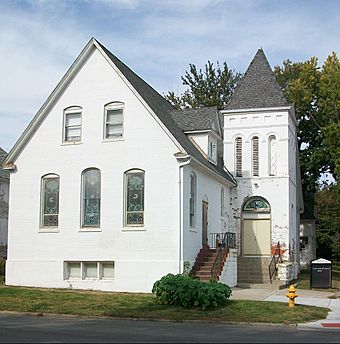First Bible Missionary Church facts for kids
Quick facts for kids |
|
|
First Bible Missionary Church
|
|

The church in 2010
|
|
| Location | 2202 W. 4th Street Davenport, Iowa |
|---|---|
| Area | less than one acre |
| Built | 1902 |
| MPS | Davenport MRA |
| NRHP reference No. | 83002429 |
| Added to NRHP | July 7, 1983 |
The First Bible Missionary Church building, located in Davenport, Iowa, is a really old and important structure. It is so special that it is listed on the National Register of Historic Places. This means it is recognized as a historic landmark! The building was first built in 1902 to be a Congregational Church.
The Story of This Church Building
The story of this church building began a long time ago. A church group called the Congregational Church started in Davenport in 1839. Later, in 1857, another group called the German Congregational Church was formed.
Over the years, these church groups changed and merged. In 1909, the German Congregational Church joined with another mission to form the Berea Congregational Church. This Berea congregation was the one that built this very building in 1902.
In 1964, the Berea church merged again with another group and moved to a different location. After they moved out, this building became the First Bible Missionary Church. It has continued to be a home for smaller Protestant church groups ever since.
What the Church Looks Like
The church building is made of brick and sits on a stone base. It doesn't really fit into one specific building style. It has a cross-gabled roof, which means the roof has two parts that cross each other. There's also a tower on the east side of the building.
The outside bricks are painted white. The main decorations are thin, molded lines called stringcourses and its beautiful stained glass windows. The building is known for its smooth surfaces and clear, sharp lines. You might also notice the many different shapes of windows used on the building.
Other interesting parts of the design include short roof edges and a pedimented roof dormer, which is a window that sticks out from the roof. There are also windows on the east side arranged in a way that looks like a palladian window. All these details suggest a style called Neoclassicism, which was popular around the early 1900s.



